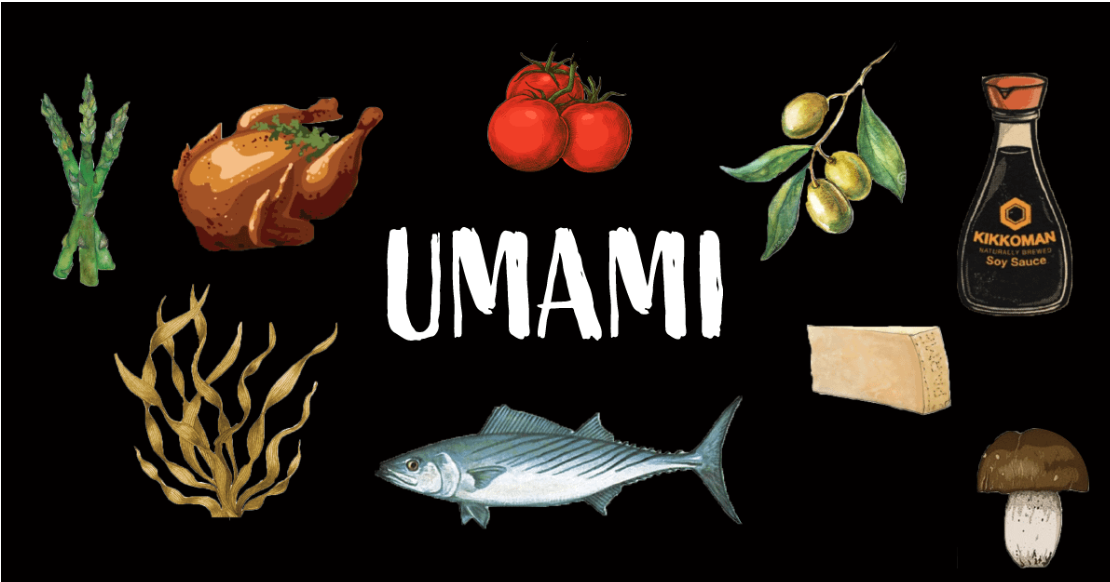Sour, sweet, bitter, salty, and… umami? Little did you know, humans have a fifth sense of taste that may be the most important of them all. Not only does umami enhance the flavor of food by creating a rich and satisfying taste and rounds out the flavor profiles of some of society’s favorite food, but it also lengthens the eater’s life.
Where Does Umami Come From? What Does It Do?
Umami stems from the taste in salts that contain one or more of the three compounds glutamate, guanylate, and/or inosinate. These compounds are naturally found in plants and/or meats. The magnitude of umami available for taste has been found to increase when the food has matured or fermented. This explains why aged cheeses, cured meats, and ripened tomatoes have high scores of the taste.
In a similar function to how bitterness indicates potential toxins in foods, or how sweetness flags the existence of carbohydrates, umami signals amino acids and, naturally, proteins are present. Proteins are strands of amino acids that are vital to human development, allowing for the synthesis of muscles, bones, hormones, and enzymes. Our bodies enjoy eating umami-filled foods simply because we need proteins. Listen to your body!
What Does Umami Taste Like?
How can one know if they are tasting umami? It’s simple: if their mouth is watering. Umami spreads across the tongue, covering it in an intense and persistent coat of hearty flavor. In turn, the flavor stimulates saliva production. The actual taste of umami is hard to pinpoint but has been described as brothy, meaty, and savory.
Foods to Try
Only “discovered” a bit more than a century ago, umami was unearthed by a scientist in Japan, the world’s heart of umami. Out of any cuisine, Japanese food utilizes the most umami-rich ingredients. Staples of Japanese food such as nori (seaweed), uni (sea urchin), tuna, and shiitake mushrooms all burst with the flavor.
Pretty much any type of vegetable, meat, seafood, or mushroom has traces or more of umami. Green tea too. If it is mouth-wateringly delicious, chances are… umami!
Health Benefits
Although it may be odd to think about, a sense of taste, umami, actually has health benefits. Normally, one would never think that something sour or salty, for example, is inherently healthy or unhealthy. However, research has indicated that components of foods that set off umami taste benefit health.
Researchers from the Tohoku University Graduate School of Dentistry in Japan found that umami is essential to healthy aging. Out of all the senses of taste, maintaining one’s ability to sense umami is paramount in the fight to live longer.
Why?
Results from the studies conducted showed that seniors no longer sensing umami would show decreased appetites and higher rates of disease.
The lack of appetite can be attributed to the fact that umami creates saliva. Without saliva to break down and swallow food, seniors do not enjoy and are not capable of eating healthy amounts of food.
Also, the additive Monosodium Glutamate (MSG), an umami-triggering salt compound — widely thought to be an unhealthy addition to foods — has been proven to have no harmful effects (in moderation) and actually increases the amount of food seniors eat. MSG acts as a healthy substitute for traditional sodium and flavors food leading to more caloric intake and decreased malnutrition.
Hong Kong, Macao, and Japan
The three countries/regions with the longest life expectancies are Hong Kong (region of China), Macao (region of China), and Japan. What are these countries doing right? How are their elderly seemingly cheating death? Umami. All three countries’ cuisines are built on the foundations of foods (fish, beef, green peas, soy sauce, etc…) that scream umami!
Follow their lead: eat lots of umami food, live to 100, simple!




Vince • Apr 23, 2024 at 12:21 pm
Lot of new information here. Thanks.